Photographs: Reuters
Nobel Peace laureate and ex-IAEA chief Mohamed ElBaradei returned home on Friday to join the largest anti-government demonstrations in decades giving a boost to Egypt's mass protest movement, as authorities braced for a new wave of protests, which has left seven persons dead.
Internet service in Egypt was disrupted and the government deployed an elite special operation force in Cairo in signs that 82-year-old President Hosni Mubarak may be toughening the crackdown following protests, which began on Tuesday against his nearly 30-year rule.
The counter-terror force, rarely seen on the streets, took up positions in strategic locations, including central Tahrir Square, site of the biggest demonstration this week.
Egypt's interior ministry also warned of 'decisive measures' against the protestors demanding Mubarak's ouster.
...
'I wish that we didn't have to go to the streets'
Image: Egyptian reformed campaigner Mohamed ElBaradei talks to journalists outside Cairo's airportPhotographs: Reuters
The warning came as Internet services suffered disruptions and cell phone text messaging was down, both used by organisers of this week's protests that led to deadly clashes between police and demonstrators.
The protest movement was also galvanised with backing of the biggest opposition group, the Muslim Brotherhood.
68-year-old Baradei, the former head of the UN nuclear watchdog and a leading Mubarak opponent who has sought to recreate himself as a pro-democracy campaigner in his homeland, said he would join mass protests planned after the weekly Friday noon Muslim prayers.
"It is a critical time in the life of Egypt. I have come to participate with the Egyption people," ElBaradei, said before leaving Cairo airport after his arrival from Vienna.
"We are still reaching out to the regime to work with them for the process of change. Every Egyptian doesn't want to see the country going into violence," he said, adding "Our hand is outstretched."
"I wish that we didn't have to go to the streets to impress on the regime that they need to change," ElBaradei said.
'It is about time for Mubarak to retire'
Image: Egyptian President Hosni Mubarak gesturesPhotographs: Asmaa Waguih/Reuters
"There is no going back. I hope the regime stops the violence," he added.
Earlier in Vienna, he told reporters he was ready to "lead the transition" in Egypt if asked.
"I am still here hoping to continue to manage the process of change in an orderly way, in a peaceful way. I hope the regime will do the same."
"Mubarak has served the country for 30 years and it is about time for him to retire," he said.
But Egypt's Interior ministry warned that it would take "decisive measures" against anti-government protesters.
The warning came as dissident groups planned to hold large-scale protests in several cities after the weekly Friday noon payers for a fourth day in a row in the country's most serious anti-government unrest in decades.
'Decisive measures will be taken'
Image: An anti-government protester reacts as his relative is injured during clashes with riot police in the port city in SuezPhotographs: Mohamed Abd El-Ghany/Reuters
"The Interior ministry reaffirms its warning against such actions and affirms that decisive measures will be taken to confronting them, in accordance with the law," it said in a statement.
The warning by the Interior ministry came as internet services suffered disruptions and cell phone text messaging was down, both used by organisers of this week's protests that led to deadly clashes between police and demonstrators.
The angry nation-wide demonstrations have swelled into the largest uprising in three decades.
Seven people have been killed -- five protesters and two policemen -- and more than 100 injured. A protestor identified as Mohamed Atef died yesterday, when he was shot in the head by police during an exchange of fire between Bedouin protesters and security forces in the north Sinai town of Sheikh Zuwayed, witnesses and relatives said.
'We will take to the streets to demand the right to life, liberty, dignity'
Image: A protester runs in front of burning tyres placed to form a barricade during clashes with riot police in CairoPhotographs: Goran Tomasevic/Reuters
Mubarak's ruling National Democratic Party held talks on Thursday, according to party members, 'to evaluate the situation'.
Members of the pro-democracy youth group April 6 Movement said they would continue to take to the streets, defying a ban on demonstrations announced by the Egyptian authorities on Wednesday.
"To continue what we started on January 25, we will take to the streets to demand the right to life, liberty, dignity and we call on everyone to take to the streets and to keep going until the demands of the Egyptian people have been met," the group said.
The protests are the largest in Egypt since bread riots in 1977, four years before Mubarak came to power.
'Authorities are open to dialogue with the country's young people'
Image: Egyptian anti-government protesters attack a riot police car at the port city in SuezPhotographs: Mohamed Abd El-Ghany/Reuters
Muslim Brotherhood said late Thursday that it would participate in Friday's protests, in a departure from the cautious approach it took towards the protests.
Meanwhile, the secretary general of the ruling National Democratic Party told reporters the authorities are open to dialogue with the country's young people, who are spearheading demonstrations.
"We have held several meetings with the youth, but in the future we will be more understanding in our approach so that they can be participants," Sawfat al-Sherif told a news conference.
The protestors are also demanding the departure of the interior minister, whose security forces have been accused of heavy-handedness, and an end to a decades-old state of emergency and a rise in minimum wages.

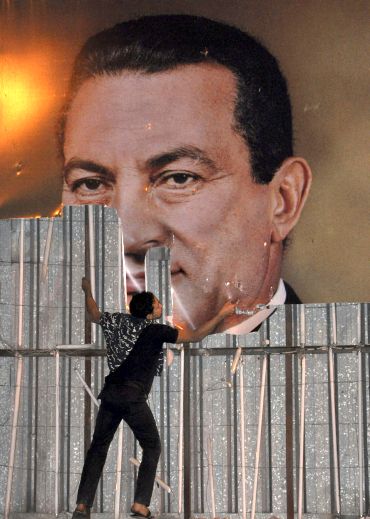
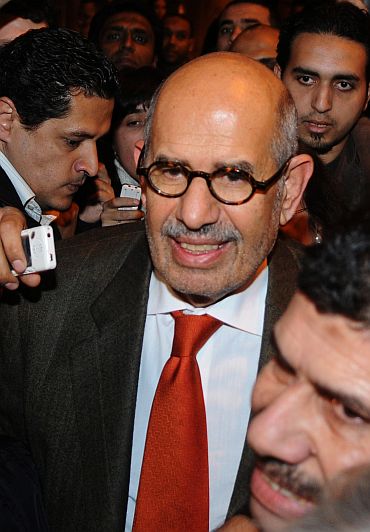
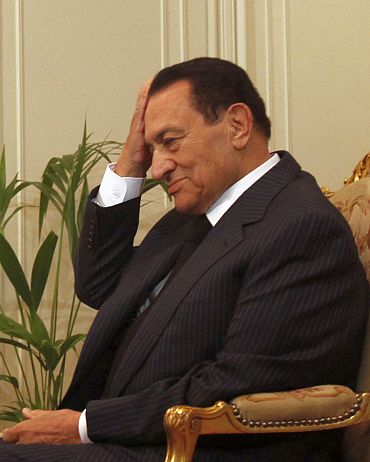
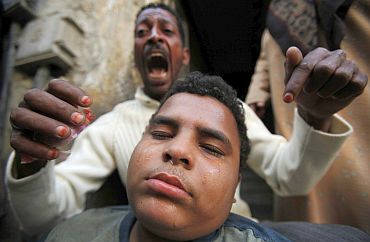
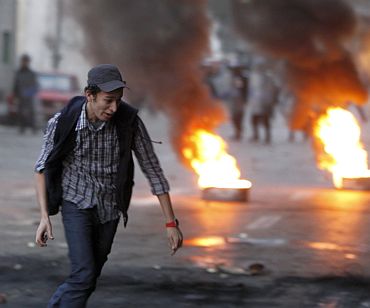
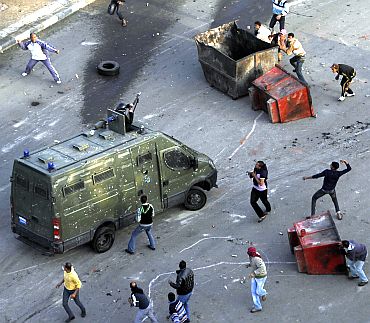
article